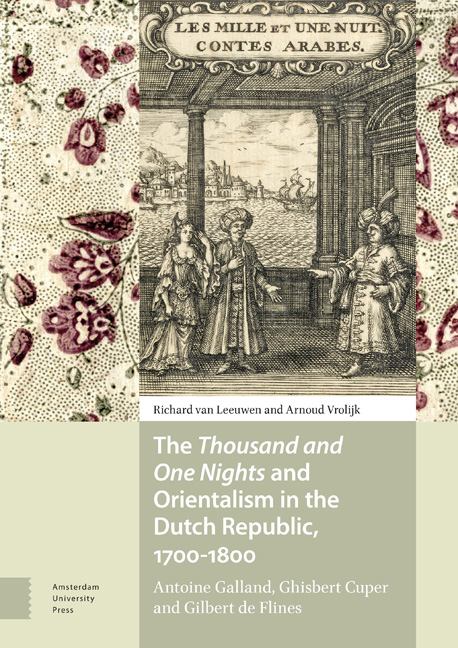 Thousand and One Nights and Orientalism in the Dutch Republic, 1700–1800
Thousand and One Nights and Orientalism in the Dutch Republic, 1700–1800 Book contents
- Frontmatter
- Contents
- Introduction
- 1 The Thousand and one nights and literary Orientalism in Europe
- 2 Dutch Orientalism before 1700
- 3 Antoine Galland and Ghisbert Cuper
- 4 The early editions of the Nights
- 5 Gilbert de Flines
- 6 Later editions in the eighteenth century
- 7 Dutch Orientalism in the eighteenth century
- Conclusion
- Appendix 1 Bibliographic survey of Dutch editions, 1705-1807
- Appendix 2 The David Coster engravings
- Appendix 3 Text samples of the Dutch Nights
- Appendix 4 French and Dutch quotations
- Illustration credits
- Bibliography
- Index
3 - Antoine Galland and Ghisbert Cuper
Published online by Cambridge University Press: 21 November 2020
- Frontmatter
- Contents
- Introduction
- 1 The Thousand and one nights and literary Orientalism in Europe
- 2 Dutch Orientalism before 1700
- 3 Antoine Galland and Ghisbert Cuper
- 4 The early editions of the Nights
- 5 Gilbert de Flines
- 6 Later editions in the eighteenth century
- 7 Dutch Orientalism in the eighteenth century
- Conclusion
- Appendix 1 Bibliographic survey of Dutch editions, 1705-1807
- Appendix 2 The David Coster engravings
- Appendix 3 Text samples of the Dutch Nights
- Appendix 4 French and Dutch quotations
- Illustration credits
- Bibliography
- Index
Summary
Intellectual networks in pre-modern Europe were not limited to scholars attached to academic institutions but also included literati and ‘amateur’ scholars who participated in the so-called Republic of Letters: the merchants, members of the professional classes, and the dilettanti who made the Grand Tour, frequented the salons, participated in literary or dramatic societies, or dabbled in science by collecting minerals or exotic species of plants and animals. Like many European scholars, Antoine Galland was an assiduous participant of the Republic of Letters, corresponding regularly about scientific issues, new discoveries and recent publications. In France, Galland was directly acquainted with intellectuals such as Pierre-Daniel Huet and abbé Jean-Paul Bignon, the head of the Bibliotheque Royale, who acted as his patron and mentor. Unfortunately, Galland's likeness has not been preserved. Perhaps his most important foreign correspondent was the Dutch scholar and administrator Ghisbert Cuper (1644-1716), who regularly exchanged letters with Galland from approximately 1700 until the latter's death in 1715. Although the two scholars never met, it is clear from their correspondence that they were attached to each other and were not merely colleagues but close friends. The correspondence with Cuper is still one of the main sources of biographical information on Galland.
Ghisbert Cuper was born in 1644. After his studies in Classical history and philology he settled in Deventer as a professor at the Athenaeum. In 1676 he became a delegate in the administration of the town, occasionally taking on the position of mayor. After having been outspoken in his pro-Orangist inclination, he was invited to become a member of the States General in The Hague, the main political institution of the Dutch Republic. In 1694 he retired from national politics and returned to Deventer to devote himself once again to the administration of the town and his scholarly pursuits. Although he wrote several treatises on Classical philology, his main significance lies in his huge collection of letters, which during his lifetime had already been bound into one hundred volumes and which remains a monumental resource on contemporary scholarly debates. Cuper's network of correspondents encompassed France, England, Germany, Scandinavia and Italy, and he was connected to the most prominent scholars of his time.
- Type
- Chapter
- Information
- Thousand and One Nights and Orientalism in the Dutch Republic, 1700–1800Antoine Galland, Ghisbert Cuper and Gilbert de Flines, pp. 45 - 52Publisher: Amsterdam University PressPrint publication year: 2019


